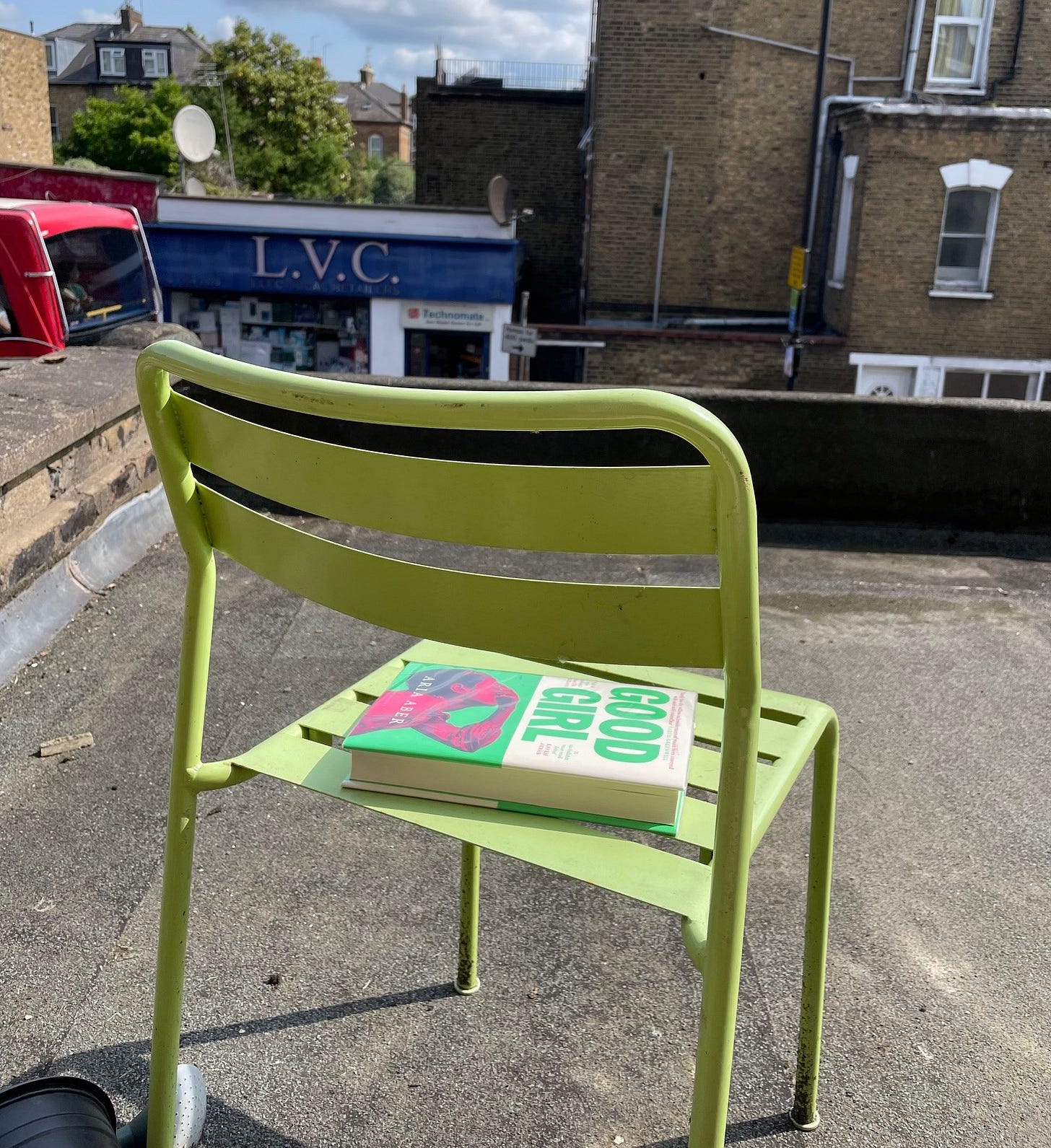The sweet spot of summer is here! Long, long days, the first truly hot weather, the sun on my skin, swimming, being able to wear sandals and not take a jacket with me when I go out for the evening, oh God it’s all so lovely, long may it last. Any reccs for good frozen desserts / ice creams v welcome - my freezer is horribly bare of sweet frozen summer treats.
books
An interesting test of a book is to leave it lying around and see how people react. I accidentally did this with Aria Aber’s Good Girl, which I’d been dipping into as I waited for everyone else to emerge downstairs post-party. Notably, it was mostly men who found things to pick apart in the quotes on the back cover or prose on the pages they dipped into. No further comment, other than to note that for the top 20 bestselling female writers of fiction and non-fiction purchased in the UK in 2023 fewer than 20% of purchasers were men. Back to Good Girl, which I enjoyed it a lot: Aber explores the tensions of Nila’s life as an Afghan immigrant in Berlin, as she walks the fine line between self-discovery and destruction. There’s quite a bit of techno-Berlin-hedonism and parts of the plot are a little predictable, but it’s a novel that lets you lose yourself briefly, and sometimes, that’s exactly what you want.
Reading this on a flat roof in Zone 2 feels appropriate vibe-wise
I spent a couple of days lounging by a pool in the South of France, kept company by Samantha Harvey’s Orbital, which I utterly loved and found much more emotional than I had anticipated. Another example of short, perfectly formed fiction. On the Booker theme, I also found Whale extremely compelling - a weird, wonderful array of characters, a wicked sense of humour, and a plot which is full of surprises and twists (thanks, Bella, for the recommendation!).
“The Chancellor doesn’t like to be paid in art” - and other non-sequiturs
I recently had the privilege of co-organising a very nerdy conference to mark the 75th anniversary of two pieces of legislation relating to heritage & cultural property. Our subtitle was ‘how heritage was saved after the Second World War and the lessons for today’. Recently, a member of HM Government stood up in Westminster and said ‘the Chancellor doesn’t like to be paid in art’. Which is unfortunate and ignorant, because the Chancellor has enjoyed payment in art for over a century, and we are all all the better for it.
Let’s go back to the beginning. Right back in 1910, Lloyd-George introduced something called ‘acceptance in lieu’ as he whacked up death duties. Namely, that if you were asset rich and cash poor, instead of paying your inheritance tax bill / death duties in cold hard cash, you could instead give the nation an object of ‘outstanding cultural significance’. If you go round reading labels in galleries with the nosiness I do, you’ll spot a LOT of items in places like the Tate, the National Gallery, the V&A etc that have been ‘accepted in lieu of inheritance tax’. Our national collections (all, by the way, accessible for free by everyone) are built on ‘payment by art’, and indeed are all the richer for it.
I think it’s worth adding in here that objects are only AIL’d if they meet a certain set of criteria, which are set out via Arts Council England and assessed by a panel of experts. You can’t leave any old painting (sorry), it has to be deemed really bloody good / important. More on this here.
Yes, government is about the building blocks of society - it should be about ensuring everyone has a safe, warm home, that we are prepared for and actively combatting the climate crisis, that our hospitals and social care systems work, our infrastructure functions, good jobs exist the length and breadth of the country, that no one in work (or indeed outside of it) should be on the poverty line. Obviously. But a government that does not care about culture, that does not see that the things that make life worth living are just as important as the basics, is failing to appreciate that people want more than the bare minimum, and that in 2025, we shouldn’t be stuck at the bottom of the hierarchy of needs.
Governments also have to deal with a tranche of extremely random things which 99.9% of the electorate never think about: maritime law and conventions! Hazardous waste! How to connect the 0.01 very-hard-to-reach places to ultra-fast broadband! Bats! Nazi-looted art! Trade policy with Lesotho! There are so many weird and wonderful parts to the modern apparatus of government, so many things we could never imagine that someone, somewhere is dealing with. Culture is, arguably, one of the least weird ones.
Sometimes I have to remind myself how utterly remarkable (genuinely!) it is that all of the UK’s major national museums are completely free for everyone. Virtually no other country I can think of has such a privilege. What a truly astounding thing we have here. Increasingly, AIL objects are allocated to regional museums too (again, free!) so it’s not just those of us who have easy access to the national museums by virtue of living in London who can enjoy world-class art. Admittedly, widening access and creating an environment in which everyone feels museums are for them and takes advantage of the option of free entry is a slightly different and more complex problem. But we should not take what we have for granted!
George Stubbs, The Marquess of Rockingham's Arabian Stallion (led by a Groom at Creswell Crags) - accepted by HM Government in Lieu of Inheritance Tax and allocated to the National Galleries of Scotland 2002
So yes, we have a government that allocates significant resource to art and culture - one which has done for over a century, and which does mean that sometimes, the Chancellor is paid in art every so often. And isn’t it a wonderful thing to live in a country where we have mechanisms to make that happen: where we can recognise, celebrate and champion the importance of free public access to art, and make that happen through levers of government?
etc
- I spent quite a bit of time in the South of France gently weeping over the quality of French produce. The fresh cherries! The criminally thick and delicious Isigny creme fraiche! The tomatoes! The garlic! The selection of pastries in the local bakery! The fresh goat’s cheese! The stuff of my dreams. Why can’t we eat like this in the UK!
- I made
’s salted vanilla & pistachio layer cake for my dad’s birthday; in a truly unheard of scenario, a bunch of very sensible 60 year olds then consumed the leftovers for breakfast. High praise indeed, and fully giving this one to an excellent recipeNo comment on my dad’s psychopathic approach to cake-cutting!
- The New Statesman’s horrifying read on new builds is well worth a read, as is Amy Key’s extremely funny piece about being propositioned by her electrician;
As ever, tell me what you’re reading! And eating! See you next time x








like your dad’s psychopathic approach to cake-cutting